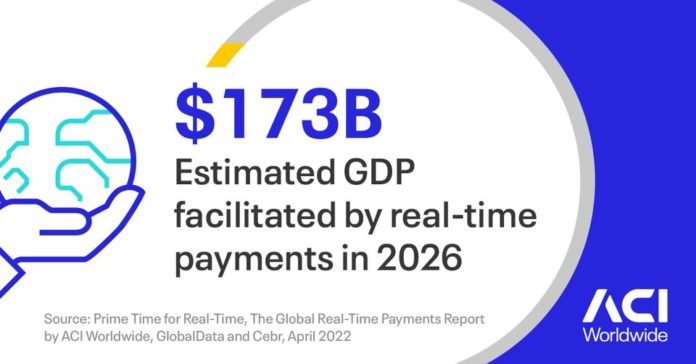Singapore is looking to unlock even more value and economic benefit from real-time payments as the market matures and the country evolves to maintain its growth and leadership, according to the third Prime-Time for Real Time real time.
The 2022 edition was published by ACI Worldwide in partnership with GlobalData and the Centre for Economics and Business Research (Cebr).
The report – tracking real-time payments volumes and growth across 53 countries – includes an economic impact study for the first time, providing a comprehensive view of the economic benefits of real-time payments for consumers, businesses, and the broader economy across 30 countries.
Real-time payments are forecast to help generate additional GDP of US$173 billion by 2026, up from US$78.4 billion in 2021, according to a Cebr economic impact study of 30 of the world’s largest economies, including both industrialised and developing nations.
In Singapore, real-time payments helped facilitate $349 million of additional economic output, equivalent to 0.1% of formal GDP.
Singapore real-time payments transactions are forecast to reach 603 million in 2026, a CAGR of 19%, while net savings for consumers and businesses are predicted to reach $231 million, facilitating additional economic output of $573 million, or 0.15% of formal GDP.
According to the report, in 2021, real-time payments accounted for 8.7% of all payments in the country and forecast to grow to 15.5% by 2026.
At the same time, the Singapore government is actively working to expand the reach of its real-time payments schemes by linking them to other real-time payment platforms in the region.
PayNow has already established a cross border, real-time payments corridor with Thailand’s PromptPay, and further linkages with India’s real-time payments system, UPi, and Malaysia’s DuitNow planned for 2022.
“Singapore continues to embrace real-time payments and is primed for even higher growth and economic benefits.” said Chee Cheng Ong, head of ASEAN at ACI Worldwide.
“As Singapore looks towards interoperability, interconnectivity, and inter-regional collaboration — there will be a high growth potential both for the domestic and cross-border market in the near term,” said Ong.
Owen Good, head of advisory at Cebr, said real-time payments improve liquidity in the financial system and therefore act as a catalyst for economic growth. This is especially important for our fast-paced and digital-led gig economies.
















